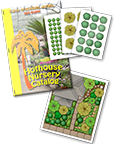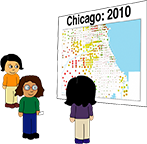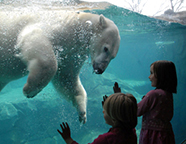Below is a list of the more established projects I am currently involved in, but I have a number of other projects cooking as well, involving user interface designs resting on technologies as far afield as Augmented Reality, flea power sensors, and mobile GPS. I'll post those here once they simmer down into a thicker broth. They are all in the service of learning, of course, and more often than not, in the service of informal learning.
As you can see by my list of collaborators below (who specialize in, variously, Urban Planning, Biology, Environmental Science, History, Geography, and Zoology), I am fairly content-agnostic - nothing inspires me more than getting introduced to a new fascinating field of human endeavor (perhaps because I can better place myself in the shoes of the learner who will one day be using the software experience we create?). Time allowing, I'm always interested in potential collaborations, so do get in touch if you have an idea you'd like to bat around with me.
| Project Title | Project Description | Collaborator(s) | Funding Source(s) |
The College Board's 2009 redesign of the Science College Board Standards for College Success has initiated a redesign of Advanced Placement tests. The new Environmental Science standards include a much stronger emphasis on "systems thinking" than has been seen in the past. We suspect that Agent-Based Models (ABMs), which are used more frequently in Environmental Science than in any other field, could help students better understand the complex interactions of human-natural systems. A limitation of educational ABMs, however, has always been sufficient access to computers - with our project, we are investigating the viability of a paper-based Tangible User Interface ("Paper-to-Parameters") that, in addition to requiring only a computer, webcam, and projector to support whole-class learning activities, may also provide unique benefits for understanding the spatial and scalar relationships between simulation elements. The project will develop an assessment tool to obtain a picture of prior understandings and attitudes held by learners in different populations (high school, undergraduate, and graduate students and experts); it will conduct an exploratory trial of the Agent-Based learning intervention to investigate the impacts on learners; andit will investigate how selected user interface features facilitate specific spatial and scalar understandings. See related posters here. |
PI: Leilah Lyons Co-PIs: Moira Zellner, Emily Minor Advised by: Tom Moher Jim Pellegrino Susan Goldman Graduate Assistants: Tia Shelley, Brian Slattery, Chandan Dasgupta |
Funded by NSF REESE Award #1020065: Integrated Study of Natural Resources, Human Impact, and Environmental Policy: Making Complex Systems Accessible for Secondary Learners Award amount: $299,225 Award Duration: August 15 2010 - July 31 2012 |
|
Museums play a role in American intellectual life as places for members of the public to gather, learn, and engage in discourse about human experience and knowledge. As cultural and historical research is informed by increasingly complex information, museums can and should support visitor discourse around such complex data. To this end, we will construct a prototype museum exhibit, CoCensus, at the Jane Addams Hull-House Museum, using an innovative combination of an ambient data map display, motion sensing technology, and RFID technology to allow visitors to interact with dynamic visualizations of census data on a local map. E pluribus unum has been a central theme in American history since the founding of the nation, yet themes of identity and difference have dominated societal conflicts for just as long. CoCensus offers a space in which people can reflect together on identity categories such as race and ancestry as imperfect mirrors of the nation, and affords shared exploration of the U.S. Census as a core record of our shared social history. This innovative design will enable multiple visitors to cooperatively investigate and discuss complex data and the personal dimensions of American identity. This work highlights important issues for designing public educational spaces to support collaborative data visualization, and take steps towards making large digital resources accessible within the social learning milieu of museums. See related poster here. |
PI: Leilah Lyons Co-PIs: Josh Radinsky, and Lisa Lee and Lisa Junkin of the Jane Addams Hull-House Museum Graduate Assistants: Francesco Cafaro, Jessica Roberts, Vikrem Bhagi |
Funded by NEH Digital Humanities Start-Up Grant: CoCensus: Collaboration Exploration of Census Data in a Museum Award amount: $49,999 Award Duration: September 2011 - September 2012 Funded by UIC IPCE Civic Engagement Research Fund Award: CoCensus: Collaborative Exploration of Social Data in Social Spaces Award amount: $25,000 Award Duration: January 2011 - June 2011 |
|
| System Simulations for Stakeholders | Local governing bodies are often tasked with turning guidelines for "green" development into actual plans, but how to convert these guidelines into specifc plans is far froma straightforward process, owing to the many ways human actions can interact with natural systems. In this project, we are exploring the potential for facilitated workshops with Agent-Based Models to aid stakeholders in the planning process. See related poster here. |
PI: Moira Zellner Co-PIs: Charles Hoch, Andy Johnson, Leilah Lyons, Emily Minor, Josh Radinsky Graduate Assistants: Ethan Brown, Lissa Domoracki, Carl Kunda, Dan Milz, and Jennifer Weizeorick, and Chandan Dasgupta and Andrew Greenlee in an earlier incarnation |
Funded by NSF CI-TEAM: Enhancing Stakeholder Participation in Environmental Planning with Visualization Tools that Support Complex Systems Learning and Spatial Thinking Award amount: $249,953 Award Duration: September 2011 - August 2013 Funded by UIC Chancellor’s Discovery Fund for Multidisciplinary Research: Participatory Modeling and Planning for Sustainable Water Management in McHenry County (PI: M. Zellner, Co-PIs: L. Lyons, M. Gonzalez) Award amount: $55,705 Award Duration: May 2011 - May 2013 |
The overarching purpose of the Climate Literacy Zoo Education Network is to develop and evaluate a new approach to climate change education that connects zoo visitors to polar animals currently endangered by climate change, leveraging the associative and affective pathways known to dominate decision-making. Utilizing a polar theme, the partnership brings together a strong multidisciplinary team that includes the Chicago Zoological Society of Brookfield, IL, leading a geographically distributed consortium of nine partners. |
PI: Alejandro Grajalof the Chicago Zoological Society Co-PIs and other collaborators: See the project website for the whole list |
Funded by NSF CCEP Award #1043284: CCEP-I: Climate Literacy Zoo Education Network Award amount: $1,000,000 Award Duration: September 15 2010 - August 31, 2012 |


